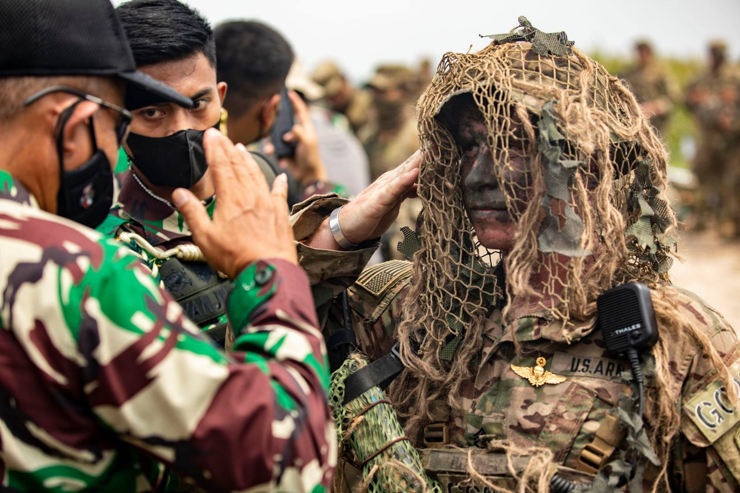The US and Indonesia are holding a fortnight-long military exercise in three Indonesian islands, with thousands of soldiers, sending a clear message to China not to impede freedom of navigation in the Indo-Pacific region. The US is also providing funding assistance to Indonesia in its battle against Covid-19.
The Garuda Shield exercises
The military exercises taking place at Sumatra, Kalimantan and Sulawesi will continue till August 14. Nearly 3,700 soldiers from the two nations are participating in the military drills.
Though both countries have been holding joint drills every year for the past 14 years, this military exercise is their largest ever. It also holds significance because of the charged-up atmosphere in the region—from the Korean peninsula to Taiwan strait and the South China Sea (SCS).

US and Indonesian officers prepare for Garuda Shield military exercises (Photo courtesy: US Embassy Jakarta)
Indonesia lies on key shipping lines
Speaking with India Narrative, Prof. Baladas Ghoshal—former General Secretary at the Society for Indian Ocean Studies—says that Indonesia, like the other Association of Southeast Asian Nations (ASEAN) countries, is feeling uncomfortable due to China's adventurism in the region. "They might be close to China but they seek security and want more Indo-Pacific cohesiveness", says Ghoshal.
"Indonesia occupies an important geo-strategic region as it is located on major sea lanes connecting South Asia to East Asia and also Australia—therefore, overlooking the major trade and energy corridors. It looks into the Pacific Ocean through the Malacca Strait where it can pose a big problem to China if the need arises", Ghoshal says.
Restricting China in Indonesian waters
With China claiming all of SCS as its maritime zone, it has initiated disputes with Taiwan, Vietnam, Malaysia, the Philippines and Brunei. China also has a territorial dispute with Japan over the Senkaku islands. With Indonesia, it has territorial disputes over the Natuna Islands, while Indonesia claims waters around it as its Exclusive Economic Zone.
Now the US will help Indonesia develop the Natuna Islands to ward off Beijing. It will also provide Indonesia with $3.5 million to build a maritime training centre this year to augment its maritime capacities. Japan also has pitched in with developing ports and enhancing patrol capabilities to restrict China's territorial ambitions.
Funding the Covid-19 battle
Going beyond the military exercise, the US and Indonesia are also augmenting diplomatic relations. Indonesian Foreign Minister Retno Marsudi is in the US to "deepen the US-Indonesia Strategic Partnership." The White House added that the US "will provide an additional $30 million in Covid-19 assistance to Indonesia, bringing the total US assistance to Indonesia since the start of the pandemic to more than $65 million".
The US will also provide PPE to the Indonesia armed forces.
National Security Advisor Jake Sullivan who met Marsudi a few days back reiterated American support for "ASEAN centrality and ASEAN’s essential role in the Indo-Pacific’s regional architecture". The two countries also discussed the importance of freedom of the seas and adhering to the UNCLOS principles in the SCS.
US engagement with ASEAN
With the ASEAN region hogging the limelight in a highly polarised world due to China's aggressive military manoeuvres, the US is increasingly focussing on the region. Last week Defence Secretary Lloyd Austin visited Singapore, Vietnam and the Philippines. Austin's biggest success was persuading Manila to continue with the Visiting Forces Agreement that allows the US to keep rotating its troops in military bases—strengthening the country to stand up to China.
Last month another high-ranking official from the Biden administration, US Deputy Secretary of State Wendy Sherman was in Japan, Mongolia and China to build a stronger response with regional allies as much as to remove the wrinkles out of the deepening rift with Beijing.
Read more on what is happening in the region:
South Korea seeks aircraft carrier amid Indo-Pacific turmoil
India outlines its benign Indo-Pacific strategy with deployment of four warships
Indo-Pacific nations sharpen claws against China with US weapons
Germany joins warship swarm in the South China Sea
Talisman Sabre 2021 war games emit multiple signals to China in the Indo-Pacific theatre
Japanese white paper points to China's rise in technology and military as a threat to regional peace




















